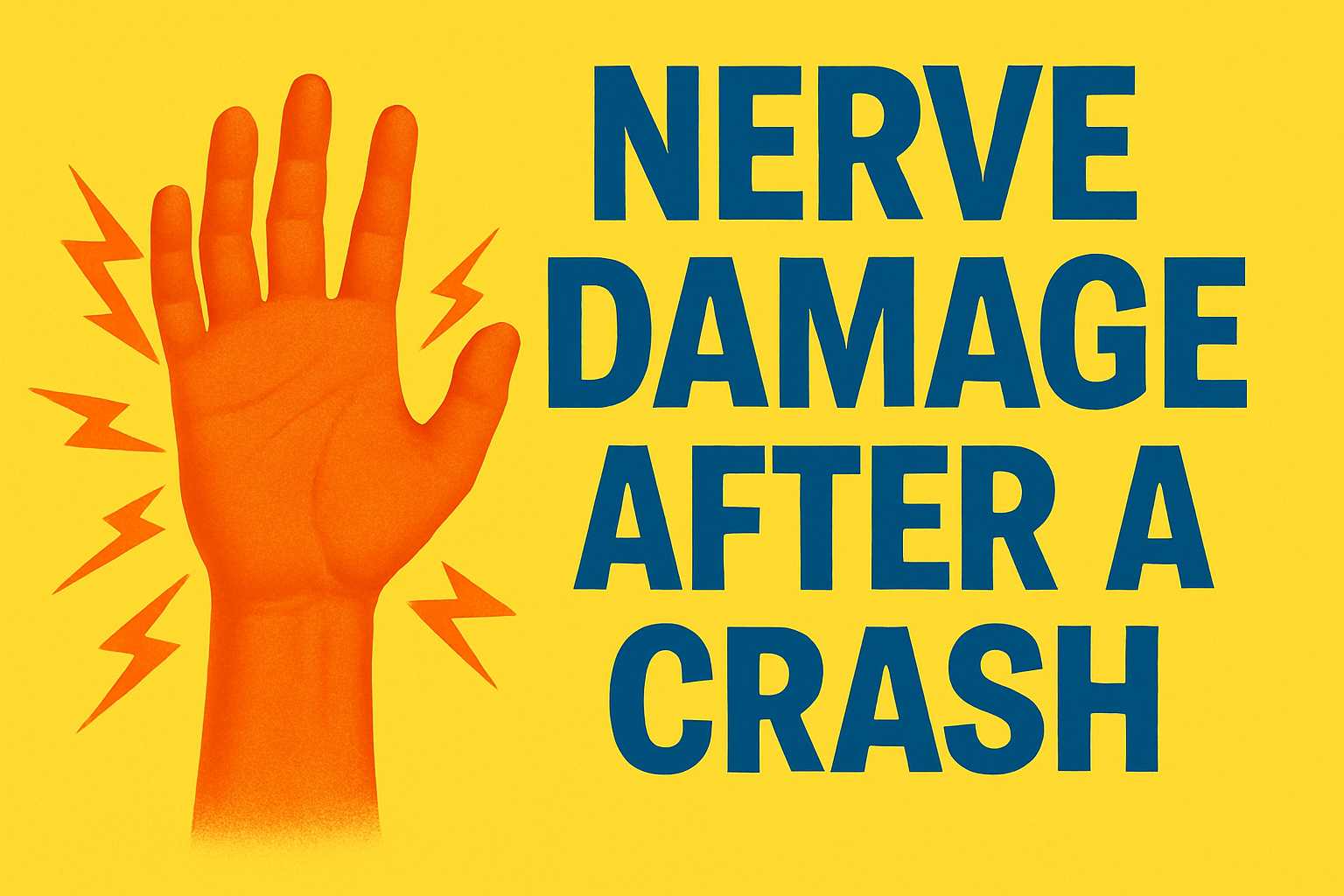Nerve Damage After a Crash

Signs of Nerve Damage After a Crash
Car accidents can cause more than just broken bones or bruises. In many cases, victims experience hidden injuries that aren’t obvious right away. One of the most serious of these hidden injuries is nerve damage. Nerve damage after a crash can affect your ability to move, feel, or even work—sometimes for the rest of your life.
At Anderson Franco Law, we represent car accident victims in California who suffer nerve-related injuries. In this article, we explain the signs of nerve damage after a crash, how it happens, and what to do if you suspect you have it.
What Is Nerve Damage?
Your body has a network of nerves that carry signals between your brain and the rest of your body. These nerves help control movement, sensation, and pain. When a nerve is damaged in a car crash, the messages between your brain and body can get disrupted.
There are three main types of nerves:
- Sensory nerves control feeling like heat, cold, or pain.
- Motor nerves control movement in your muscles.
- Autonomic nerves control things like blood pressure, digestion, and heart rate.
A car crash can damage any or all of these types of nerves, depending on how the accident happened and where the body was impacted.
Common Causes of Nerve Damage in Car Accidents
Nerve damage can happen in many different ways during a car crash:
- Whiplash can stretch or compress nerves in the neck.
- Blunt force trauma can crush or sever nerves in the limbs or back.
- Herniated discs in the spine can press on nearby nerves.
- Broken bones can pinch or cut nerves nearby.
- Airbag deployment or seatbelt injuries can damage nerves in the chest or shoulder.
- Lacerations can directly cut nerves in the arms or legs.
Even if you walk away from a crash feeling okay, nerve damage might show up days or even weeks later. That’s why it’s important to know the signs.
Signs You May Have Nerve Damage After a Crash
Nerve damage looks different depending on the part of the body affected and how serious the injury is. Here are some of the most common symptoms:
1. Tingling or “Pins and Needles” Sensation
You might feel a strange tingling in your hands, feet, arms, or legs. It can feel like your limb is “asleep,” but the sensation doesn’t go away.
2. Numbness
Loss of feeling in a part of the body can be a warning sign of nerve damage. If you can’t feel heat, cold, or touch in certain areas, it’s time to see a doctor.
3. Burning or Sharp Pain
Some people with nerve injuries experience a burning, stabbing, or shooting pain. This pain is different from regular muscle soreness—it can be severe and constant.
4. Muscle Weakness or Paralysis
Nerve damage can cause your muscles to weaken or stop working properly. You may notice it’s hard to grip things, stand, or walk normally.
5. Twitching or Muscle Spasms
Involuntary muscle movements or spasms, especially in your arms or legs, could be signs that your motor nerves are affected.
6. Sensitivity to Touch
Even light touches or clothing rubbing against your skin may cause pain or discomfort if your sensory nerves are injured.
7. Bowel or Bladder Issues
If your autonomic nerves are damaged, you may have trouble controlling your bladder or bowels—this is a serious sign that requires immediate medical attention.
When Do Symptoms Start?
Nerve damage doesn’t always show up right after a crash. In fact, many symptoms develop slowly over time. You may feel fine on the day of the accident and only notice issues days later. This delay makes it harder to connect the nerve damage to the crash unless you documented your pain early on and sought medical help right away.
That’s why it’s critical to see a doctor immediately after an accident—even if you don’t feel injured. Imaging tests, like MRIs or nerve conduction studies, can help detect nerve injuries that aren’t visible from the outside.
How Is Nerve Damage Diagnosed?
Doctors use a mix of physical exams and tests to check for nerve injuries. These may include:
- MRI scans to check for spinal or nerve compression
- CT scans to view bones and surrounding tissues
- Electromyography (EMG) to test muscle and nerve function
- Nerve conduction studies to see how fast nerves send signals
The sooner the damage is diagnosed, the better your chances for treatment and recovery.
Can Nerve Damage Be Treated?
Yes—but the treatment depends on the type and severity of the damage. Some nerve injuries heal over time, while others require surgery or long-term therapy. Common treatments include:
- Physical therapy to strengthen muscles and improve mobility
- Medications to manage pain, inflammation, or nerve signals
- Steroid injections to reduce swelling near the nerve
- Surgery to repair or decompress nerves in severe cases
Recovery from nerve damage can take months or even years. Some people never fully regain function. That’s why it’s important to take the injury seriously—and to seek legal help if the accident wasn’t your fault.
What Should You Do If You Suspect Nerve Damage?
If you believe you have nerve damage from a crash, here’s what you should do:
- Seek medical attention immediately. Early diagnosis improves outcomes.
- Follow all treatment recommendations. Skipping appointments can hurt your health and your legal claim.
- Document your symptoms. Keep a journal of how you feel, what treatments you receive, and how the injury impacts your daily life.
- Avoid giving statements to the insurance company without a lawyer. They may try to downplay your injuries or deny your claim.
- Speak with a personal injury attorney. Nerve damage can lead to high medical costs and long-term disability. An experienced lawyer can help you pursue compensation.
How Anderson Franco Law Can Help
At Anderson Franco Law, we understand how serious and life-altering nerve damage can be. We represent clients across San Francisco and California who suffer from nerve injuries caused by car accidents, motorcycle crashes, or other traumatic events.
Our firm can help you:
- Investigate the crash and prove liability
- Gather medical evidence of nerve damage
- Calculate the full extent of your damages—both current and future
- Negotiate with insurance companies
- File a lawsuit if necessary and prepare for trial
We offer free consultations and only get paid if we win your case. You don’t need to suffer in silence or handle this alone.
Don’t Ignore the Signs—Protect Your Health and Your Rights
Nerve damage is one of the most painful and lasting injuries a person can suffer after a crash. Left untreated, it can lead to permanent disability, chronic pain, and loss of income. If you notice any signs of nerve injury after a car accident, get medical help right away—and then contact a personal injury attorney.
At Anderson Franco Law, we’re here to fight for the compensation you need to move forward. Contact us today to schedule your free consultation and take the first step toward recovery.









